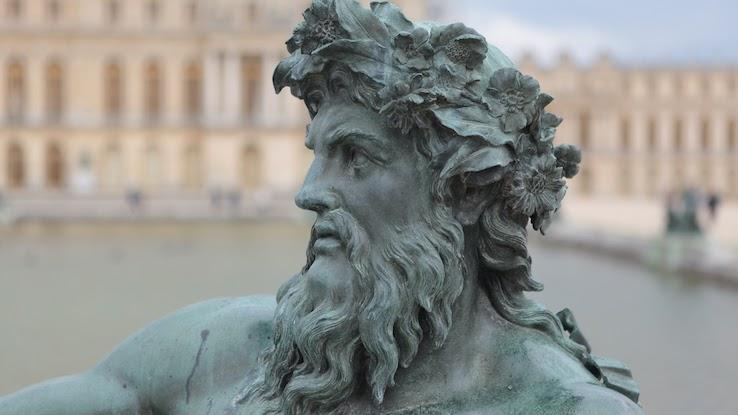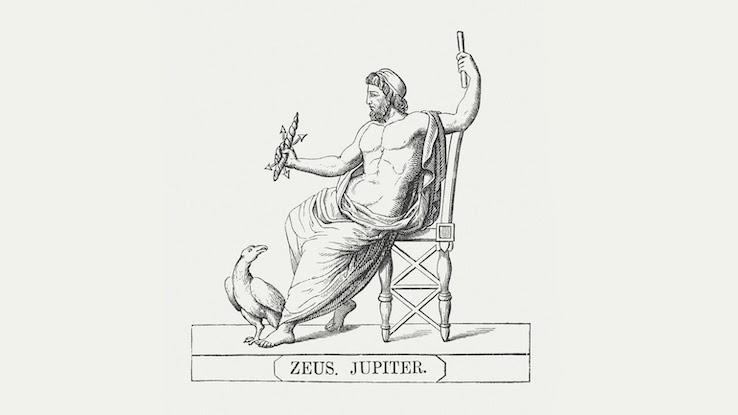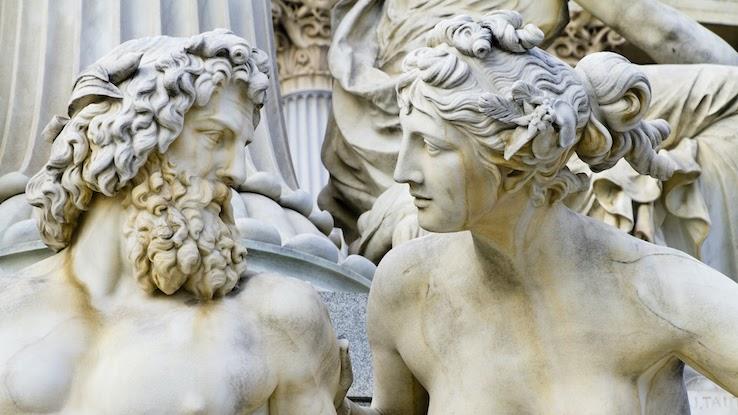Cities of the Gods Communist Utopias in Greek Thought Review

Greek mythology is a fascinating collection of stories from ancient Greek culture that explain the origins of many things and provide reasoning for the nature of the globe. These myths made up the faith of the ancient Greeks, and their intention was to teach people well-nigh the significance of many aspects of the world. There are many characters that appear repeatedly in these myths, merely Zeus might be one of the nigh famous.
Zeus was a primary figure in Greek mythology who's however known today as the "Father of the Gods." From Mount Olympus, where all the Greek gods lived, Zeus ruled over and protected both humans and the remainder of the gods. This is largely what fabricated him 1 of the almost prominent figures in Greek mythology. Today, studying Greek mythology helps us understand the life and culture of the ancient Greeks, including their religious, political and social structures — and studying Zeus helps us better empathise Greek mythology every bit a whole.
How Did Zeus Become the Begetter of the Gods?
Zeus was the son of Cronus and Rhea, two Titans, which the Greeks believed were the direct descendants of Uranus, who represented sky, and Gaia, who represented Earth. Cronus began his reign over the heavens by stealing power from his own male parent, which led Cronus to develop a reputation for being a greedy, envious god. Equally a result, Cronus also believed that one of his children would eventually take his ability from him.

To avoid this, he decided to swallow all of his children, including Hera, Hades, Hestia, Demeter and Poseidon. Zeus was saved from this fate by his female parent Rhea, who tricked Cronus into thinking he'd besides swallowed Zeus. Instead, she sent Zeus to Crete, where Gaia raised him with the help of the nymphs — beings that were often associated with plants.
When Zeus grew up, he found out what Cronus had done. Zeus then gave him a potion so Cronus would cough his children back upwardly. Uniting with his newfound siblings — who had become the other Greek Olympian gods — Zeus waged a fight against Cronus and the other Titans. They viewed the Titans as lawless and thought it necessary to take over to brand the earth meliorate. At this time, Zeus also married his sister Hera.
The conflict betwixt the Olympian gods and the Titans heated up as Gaia encouraged the Titans to maintain control of the world. This resulted in a series of battles known as Titanomachy, which lasted for 10 years. With the assist of the Cyclopes (one-eyed giants who gave Zeus his lightning bolts) and Hecatoncheires (hundred-handed giants), Zeus and the Olympian gods won the war and imprisoned the Titans in the deep trenches of the Underworld.
Upon their victory, Zeus became the rex, or "Male parent of the Gods," who ruled over heaven and World and all the gods and other beings in information technology. He also made his brother Poseidon the ruler of the seas and his blood brother Hades the ruler of the Underworld.
What Does Zeus Symbolize?
Considering Zeus was such a powerful force in Greek mythology, he inspired many artists who wanted to honour him. In much of this art, Zeus is typically portrayed with a long beard, and he holds both a scepter and thunderbolt. Zeus is also oftentimes depicted wearing a crown of oak leaves. This symbolizes his part as a natural authority figure who was known for being powerful, wise and simply.

The symbol of the thunderbolt represented other traits of Zeus, too. Aside from being the god in accuse, Zeus was also known for decision-making the weather. The thunderbolt represented Zeus' tendency toward anger besides, which he demonstrates in many of the Greek myths that include him. Equally the ruler of the gods, he adult a reputation for handing out severe punishments.
Despite his anger, Zeus was besides a peacemaker who reconciled many conflicts. This trait helped residue out his reputation. His anger led him to deliver serious punishments, simply only when they were deserved. On the other hand, his trend to help resolve issues showed that he was off-white.
Zeus is famous for having an abundance of love affairs with both goddesses and mortal women, usually by disguising himself in other forms. This upset his wife, Hera, and was the crusade of many of their conflicts that appear in dissimilar Greek myths. It also explains why Zeus became known for having many children, some of whom were gods, while others were one-half-god and one-half-mortal. Some of his well-nigh well-known children who also often announced in different mythological tales were Ares, Persephone, Athena, Dionysus, Hercules, Hermes, Apollo and Artemis.
What Are Some Popular Greek Myths Involving Zeus?
There are dozens of myths in which Zeus plays a starring function, and he frequently appears as a background grapheme too. One popular myth tells the story of Zeus and Hera's coming together and eventual spousal relationship. Initially, Zeus vicious in love with Hera, merely she wasn't interested. Knowing that Hera loved animals, he transformed himself into a bird so he could wing into her sleeping room and amuse her.

Their happiness didn't concluding besides long, though. Because Zeus had many diplomacy with other goddesses and women, his marriage to Hera provides context for plenty of other Greek myths. Hera's jealousy is ofttimes at the heart of the stories, where she'south seen directing her anger not only at Zeus just at the offspring that resulted from his cheating.
Before Hera, Zeus was with a Titan named Metis, who was responsible for crafting the potion that made Cronus regurgitate his other children. When Zeus heard a prophecy that they would accept a son who would overthrow him, he turned Metis into a wing and swallowed her. Little did he know, she was already meaning with their daughter, Athena, who was later born from Zeus' head. Considering he swallowed Metis, Zeus gained some of her wisdom as a upshot, and it became role of who he was. Athena also gained that trait from her mother and became the new goddess of wisdom. She also became the goddess of state of war thanks to Zeus' fiery tendencies that he passed to her.
The myth that explains how humans discovered burn also involves Zeus. Zeus kept fire from humans out of acrimony. Merely Prometheus, a Titan, secretly gave humans fire by hiding information technology in a stalk of fennel. Humans were able to make groovy advances every bit a outcome, leading them to civilization. True to form, Zeus became enraged with Prometheus' defiance and punished the Titan harshly.
Many of the lessons in Greek mythology helped the ancient Greeks explain many of life's complexities. They helped to teach the concepts of good versus evil, the ability of honey and the consequences of things similar greed and fearfulness. Because Greek mythology was followed similarly to a religion, the myths were probable designed to teach guild most morals. For instance, Zeus frequently let his anger become the best of him, and this is a lesson on the value of controlling your emotions. This demonstrates how many of the ancient Greeks' teachings are yet of import today.
Source: https://www.reference.com/history/basic-history-zeus-greek-god?utm_content=params%3Ao%3D740005%26ad%3DdirN%26qo%3DserpIndex
0 Response to "Cities of the Gods Communist Utopias in Greek Thought Review"
Post a Comment